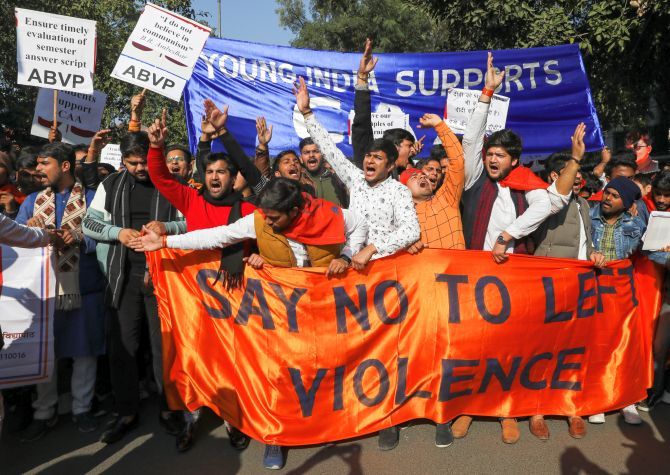The student front of the Rashtriya Swayamsevak Sangh has blotted its CV by allegedly instigating and engaging in violence on marquee campuses like JNU and Hyderabad Central University, notes Radhika Ramaseshan

The Akhil Bharatiya Vidyarthi Parishad’s charter of aims and purposes is clear that students’ power should be treated as “the nation’s power and not a nuisance” to be frittered away on turbulent varsity conflicts and “politicking”. Ideally, it is an “asset” that should be funnelled into playing a “leading role in public education, public service... while confronting corruption and anti-national attributes with fervent pride...”
Founded as the student front of the Rashtriya Swayamsevak Sangh in 1949 by Yashwantrao Kelkar, a Sangh pracharak and literature professor from Mumbai, the ABVP predates the birth of the Bharatiya Jana Sangh (the precursor to the Bharatiya Janata Party) by three years. It was recognition by the Sangh that if its ideology had to take deep root, it was best aimed at the new kid on the block. This makes the ABVP the RSS’s oldest and, some might say, its favourite offspring.
Unlike the BJP and the Bharatiya Mazdoor Sangh, the Sangh’s labour wing, which assert their autonomy every now and then, the ABVP is like a teacher’s pet, subservient to the RSS and generally confined to building on its core beliefs, rooted in the Sangh’s “nation first” ideology.
Unlike the student unions aligned with the Left parties which are extremely strong in a few varsities but like the Congress’s National Students Union of India, the ABVP has a presence, significant or marginal, in most universities and colleges. Sunil Ambekar, an RSS pracharak who until recently was organising secretary, noted the ABVP had a 5,00,000-strong cadre and 3.2 million members.
Notwithstanding the lofty proclamation to being a self-righteous student outfit, since 2014, coinciding with the BJP coming to power at the Centre, the ABVP blotted its CV by allegedly instigating and engaging in violence on marquee campuses like Jawaharlal Nehru University and Hyderabad Central University.
BJP leader Sudanshu Mittal, a former ABVP activist who headed the Delhi University Student Union in 1983, rejected the charge. “The ABVP has been facing persecution and violent opposition (from the Left unions) in JNU for years. This year, it resolved that if it was physically targeted, it will retaliate,” emphasised Mittal.
A senior BJP office-bearer, formerly with the ABVP, argued: “The violent provocations have come from the Left. The ABVP is strong in Himachal Pradesh, where the NSUI is the main competitor. Where is the violence? If ABVP was genetically violent, there should have been trouble on more campuses.”
Being flexible is the ABVP’s working credo. Prafulla Kanta, national joint organising secretary, explained why. “Since its inception, we have never been irrelevant. Our working style and activities were tailored to suit the day’s issues. We were the first student organisation to embrace social media. To disseminate our ideology and expand the organisation, we entered IITs, IIMs, central universities, and research institutions. At National Law Schools, we opened up an avenue for policy-making for the students by starting the Anubhooti rural internship programme, which takes them to villages every year. We are concentrating on art and cinema as these impact social sensibilities.”
As evidence of a conscious policy to foster “social inclusion” and enlarge the geographical spread, for the first time the ABVP’s national team is headed by a Tamil -- Shanmugam Subbiah, senior consultant in surgical oncology at Chennai’s SIMS Hospital and former professor at Kilpauk Medical College.
Despite being the BJP’s older sibling, the ABVP’s relationship with the Sangh’s political progeny is peculiar. The bulk of the BJP’s talent and leadership has been drawn from the students’ front but the BJP’s primacy in the RSS’s overall scheme overturned the order.
Amit Shah, home minister, cut his political teeth in the ABVP. So did J P Nadda, his putative successor. The upper crust of the Narendra Modi government -- barring Modi himself who entered the BJP through the RSS -- is drawn from the ABVP and includes Rajnath Singh, Nitin Gadkari, Ravi Shankar Prasad, Dharmendra Pradhan, and Prakash Javadekar. M Venkaiah Naidu, vice-president, and Om Birla, Lok Sabha speaker, too, were ABVP members.
“No doubt a lot of talented persons from the ABVP have gone into politics but to say we only look for political talent is not correct,” said Subaiah.
Ambekar pointed out Milind Kamble, founder chairman of the Dalit Indian Chamber of Commerce and Industry, was an ABVP alumnus, while Mittal cited the example of Dattatreya Hosabale who spent over two decades in the ABVP and moved to the RSS where he became joint general secretary.
As Ambekar departs after a 29-year association with the ABVP, Ashish Chauhan, Himachal Pradesh-born journalism graduate who has been with the organisation since 2003, is set to take over as organising secretary. The organising secretary is the main functionary, cherry-picked by the RSS to run its student front. The ABVP president is always a teacher, appointed to guide “vidyarthis (students)” but the executive responsibility vests with the organising secretary.












 © 2025
© 2025